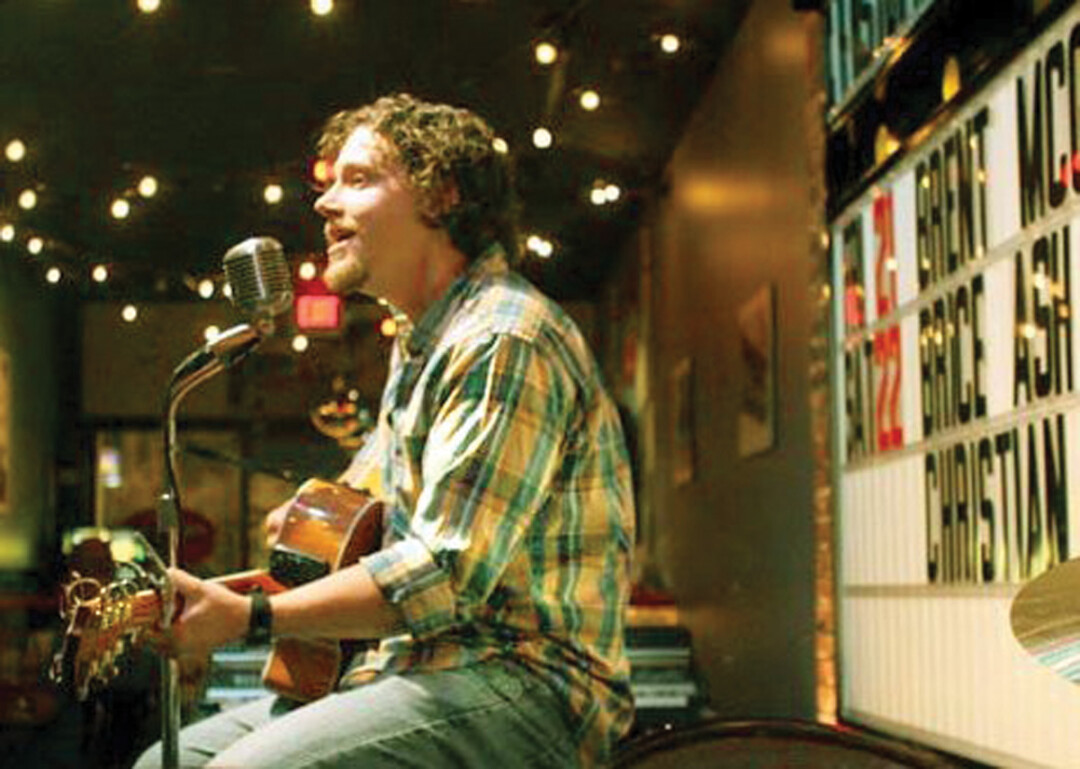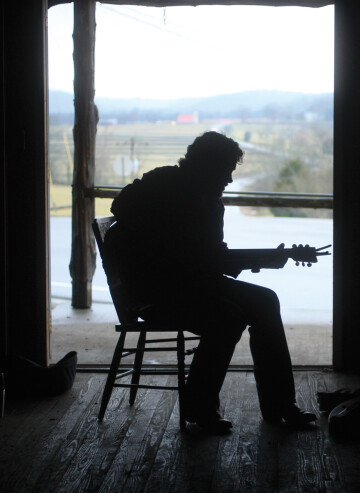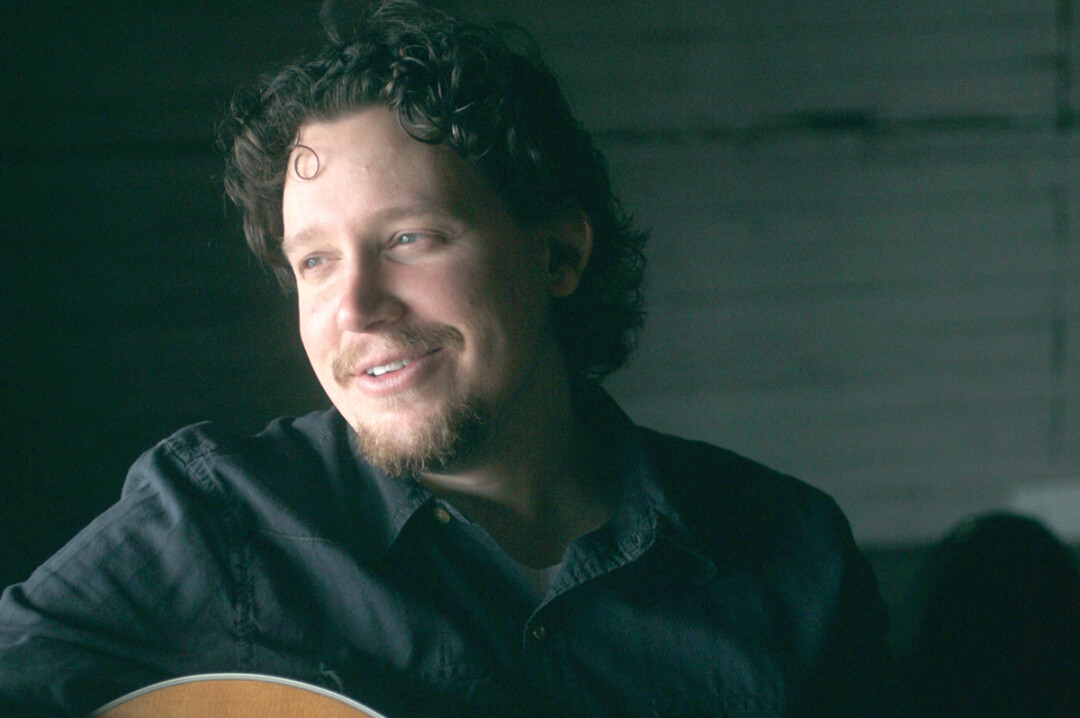Every Dreamer Needs Bozeman Believers: An Interview with Brice Ash
Nick Mack | Tuesday Dec. 31st, 2019
A horseback-rider from Billings learns the courage to press on after a crippling fall, an onion-smelling outcast takes his classmate’s mother to the high school prom, and a laid-off performer gives one final bow after sixty years working onstage. These are just a few of the tales singer-songwriter Brice Ash shares in his album, The Chariot—a collection of stories and reflections sung in the Americana tradition.
Ash recorded the album during a ten-year songwriting stint in Nashville, and, although quite satisfied with his recent move to Bozeman, he still feels the craving for the U.S. music capital’s finest export every now and again. Thus, when I meet him at Backcountry Burger Bar on an early December evening, it’s with the utmost excitement that he orders a Nashville hot chicken sandwich. “This is one of the few places out here that gets it right,” he tells me, elaborating that most restaurants tend to skimp on the spice level. I order a Calamity Jane—surely the only burger in the known universe to feature jalapeno jelly and scallion cream cheese—and the discussion moves past food as I dig into the storied career of one of Bozeman’s favorite storytellers. 
An Instrument of Freedom
Ash’s album opens with the title track, “The Chariot,” which explores aging, death, and spirituality through the experience of a boy interacting with his grandfather. “The grandpa’s kind of built out of my grandfathers,” he explains as he hands me his CD. The cover consists of a photograph from his childhood, wherein he sits on a toy horse, beaming at the camera. “I always like it when the artwork on an album weaves into the actual content. I was probably two or three here, at my grandpa’s house. That moment’s not what the song is about, but I thought it was a neat spin on it.”
Years passed in a Wichita-based childhood, and Ash eventually graduated to a new toy—his father’s Yamaha acoustic guitar, gifted to him at the age of twelve. “I just started playing around with it,” he reminisces. “Got myself a book of chords and started figuring things out. I realized early on that I don’t necessarily enjoy playing other people’s stuff; I enjoy the creation aspect. I mean, once you can put two chords together, you’re off to the races, and once you learn someone else’s song, you realize it’s not as magical as you’d thought. I generally try not learn a lot of my favorite artist’s stuff, because I want to keep that magic and not see how the sausage was made.”
That early sense of discovery hasn’t faded in the years since, and Ash worries that the freedom sometimes impedes other aspects of his art. “I rarely practice, in so much as sitting down and saying I’m going to get better at this one thing. I get too distracted by the creation part. The writing is my favorite thing about music, more so than playing or practicing or being technical.” As any sample from Ash’s album illustrates, however, he’s clearly developed a strong technical base, regardless of his practice structure. The writing is just the jalapeno jelly on a well-crafted burger.
The Seed of Emotion
Writing, like any good recipe, depends upon inspiration, and Ash explains, “There’s not necessarily a tried and true method, as far as where the inspiration comes from. There’s usually two worlds that are going on in parallel, worlds of ideas, content-wise and music-wise.” With regards to the music world, he continues, “I don’t even have to be at an instrument at the time. I’ll be driving and thinking, ‘What would it be like if I had the drums playing in four-four, and then I had the guitar and the verse playing in three-four for four measures, and then I switched back over to four-four?’ I’m always in pursuit of something that I haven’t heard before. And then there’s a lot of happy accidents that happen when the fingers hit the wrong notes on the piano or guitar.”
Content-wise, he adds, “I end up coming up with melodies by singing nonsense words or just words that come to mind, and something pops out that was in the subconscious, and then I’m stuck with a line or two, and I’m like, ‘Man, I like those lines, but now I’ve gotta build the song around them.’ So the lyrics always take longer for me than the music.” He mentions that he keeps a list of song ideas on his phone, and “a lot of times what happens is—whether deliberately or just by accident—several of those ideas will coalesce into something that makes sense together.”
When fleshing out his songs’ lyrics, Ash finds that his writing falls under two main categories. “There’s a whole set of my writing that’s just story songs, which I don’t think are on the radio very much these days; they’ve kind of been lost and relegated to old-folks stuff. I find that the imagination, a lot of times, is the gateway to the seed of emotion, and by making something up that’s imaginative and creative, sometimes you can get to places that you just couldn’t get to in real life. And then, on the other hand, a lot of it is based on my life, but also trying to put myself in a different spot.”
Influential Characters
In Ash’s seventh track, “Most Famous Man,” the hitchhiking point-of-view character encounters a few unlikely good Samaritans, who impart sage insights on peace and home along his travels. Ash ran across a similarly wise figure on his first visit to Nashville, when visiting the Bluebird Café, a world-famous songwriter hangout. Inside the café, he sat down with Rivers Rutherford, a country artist who, just this past October, was inducted into the Songwriters Hall of Fame.
Ash recalls, “He mentioned a technique that I started using. He has multiple characters that he’s defined in his head, and then he’ll sit down and write a song from the perspective of one of those characters. So he has a real blue-collar character, I don’t know, he calls him Bubba or something, and then he has other characters. I don’t necessarily have go-to guys, but I try to define a character before I write, or try to define a point of view, instead of just writing out of the blue.”
Rutherford’s advice swirls in the well of inspiration that Ash has filled with many influences along his musical journey. “When I was growing up,” he says, “I was more into alternative rock and even a little harder stuff. I loved Soundgarden, just ‘cause they would play with the rhythms and time signatures in a way that not a lot of other people were doing that well. A buddy of mine introduced me to Townes Van Zandt, Guy Clark, Steve Earle, Rodney Crowell—the whole Americana thing at the time, although they didn’t call it that back then, and that was like the gateway drug.” In terms of contemporary artists, Ash names Patty Griffin and Jamey Johnson as musicians whose work he admires.
While he can’t compliment much of what plays on the radio these days, especially commercial country songs featuring “the same four chords and the same imagery,” Ash admits, “I don’t mind Taylor Swift. She’s got a lot more talent than I think a lot of people give her credit for. Her new stuff, I try and have an open mind on. I don’t find it as musical, like melodically, but there’s almost always something in the song that’s like, ‘Ah, that’s pretty cool.’” He adds that he branches out to other genres at home, where he enjoys listening to showtunes, Marvin Gaye, and old R&B with his family.
Plugged into Bozeman
Family was the driving force that drew Ash to Bozeman three years ago. “My wife’s from Montana,” he explains. “Her parents live in Billings, so we would always visit once or twice a year and usually come through Bozeman, because her grandmother raised her kids here. They were Stuckys [of Stucky Road fame]. We had talked about moving to Montana eventually, just to be closer to family, since we didn’t have any family in Nashville. We came through a few summers ago, and it was just amazing weather, and we went to Music on Main with the kids. Talking on the way back, we were like, ‘Man, if we’re ever gonna do it, we need to do it now, or the kids are gonna hate us.’”
Through his day job as a performance engineer for Verizon, Ash secured a transfer to Montana, and he hasn’t looked back since. “It’s been really fun getting involved and plugged into the music community in Bozeman,” he continues. “There’s this trio that I put together: Alex Platt is on drums, and then Kyle Brenner is on cello. It’s been a really fun operation with those guys. I think the cello provides a unique sound.”
The trio, called Brice Ash and the Kin, frequents many local venues, but Ash specifies, “My favorite places to play are the ones that are meaningful to me outside of music. When we were deciding whether or not to move here, we came into town and checked things out. We were sitting in Bridger Brewing and there was a band playing. The pizza was great, and the people were great, and it was just such a warm environment. I love that all the music’s six to eight, so the kids can come and watch. So I love playing Bridger, but a lot of places are great.”
Fork, Spoon, and Guitar
Another venue especially dear to Ash is the volunteer-run Fork and Spoon, which he endorses for its gracious vision and excellent food. He recalls, “There was an article several months ago about how they’ve had difficulty making the numbers work, because they’re a pay-as-you-can organization. So I called the gal that’s running it, and one of their challenges is getting new people to come in. I pitched the idea that, what if, monthly, I hosted a music night.”
The concept gathered more steam than Ash could have hoped. “I reached out to a bunch of fellow musicians, and now I’ve got it booked through February. There were a lot more people that wanted to play, and I just decided, let’s book through February, and then we’ll start booking again. A lot of times, the musicians will bring a fairly good-sized crowd, so it’s been fun to partner with that organization.” A few weeks ago, Ash brought in Joe Knapp, this magazine’s featured artist from October. Knapp, playing under his stage name, SlomoJoe, packed the restaurant wall-to-wall, attracting a massive crowd despite the night’s inclement weather.
Dreams and Resolutions
The Chariot’s eighth track, “Every Dreamer…,” revolves around a chorus preaching that dreamers need believers. As I examine a photo of the standing-room-only crowd at the Fork and Spoon’s most recent music night, I see dozens of locals supporting Ash’s generous dream, and I begin to believe as well. Brice Ash has made a remarkable impact on our community in the brief amount of time he’s lived here, and although he doesn’t plan on gigging until March, his New Year’s resolution promises exciting content to come. “I want to do more writing, and then start recording some stuff. I’d love to do another album in the next year or two, so I’m taking the next few months off to write some new material and score some of the ideas musically.”
Finishing his Nashville hot chicken sandwich and preparing to venture onto Main Street’s ice-slicked sidewalks, Bozeman’s warmest, most fascinating storyteller advises, “Look for the music nights at Fork and Spoon. It’s a good cause, good food, and good music!” Thanks to this talented dreamer, the restaurant may need to expand its walls before the next show.
| Tweet |
